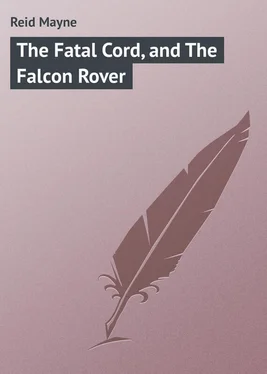Mayne Reid - The Fatal Cord, and The Falcon Rover
Здесь есть возможность читать онлайн «Mayne Reid - The Fatal Cord, and The Falcon Rover» — ознакомительный отрывок электронной книги совершенно бесплатно, а после прочтения отрывка купить полную версию. В некоторых случаях можно слушать аудио, скачать через торрент в формате fb2 и присутствует краткое содержание. Жанр: foreign_prose, на английском языке. Описание произведения, (предисловие) а так же отзывы посетителей доступны на портале библиотеки ЛибКат.
- Название:The Fatal Cord, and The Falcon Rover
- Автор:
- Жанр:
- Год:неизвестен
- ISBN:нет данных
- Рейтинг книги:5 / 5. Голосов: 1
-
Избранное:Добавить в избранное
- Отзывы:
-
Ваша оценка:
- 100
- 1
- 2
- 3
- 4
- 5
The Fatal Cord, and The Falcon Rover: краткое содержание, описание и аннотация
Предлагаем к чтению аннотацию, описание, краткое содержание или предисловие (зависит от того, что написал сам автор книги «The Fatal Cord, and The Falcon Rover»). Если вы не нашли необходимую информацию о книге — напишите в комментариях, мы постараемся отыскать её.
The Fatal Cord, and The Falcon Rover — читать онлайн ознакомительный отрывок
Ниже представлен текст книги, разбитый по страницам. Система сохранения места последней прочитанной страницы, позволяет с удобством читать онлайн бесплатно книгу «The Fatal Cord, and The Falcon Rover», без необходимости каждый раз заново искать на чём Вы остановились. Поставьте закладку, и сможете в любой момент перейти на страницу, на которой закончили чтение.
Интервал:
Закладка:
“To Planter Brandin, Esquare.
“Sir, – I guess as how ye recollex a man, by name, Dick Tarleton; an’ maybe ye mout be desireous o’ seein’ him. Ef ye be, ye kin gratify yur desire. He air now, at this present moment, in the town o’ Helena, tho’ what part o’ it I don’t know. But I know whar he will be afore mornin’. That air upon the road leadin’ from the town t’ward the settlements on White River. He arn’t a gwine fur out, as he’s travellin’ afoot, and he’s sartin to keep the trace through the bit o’ clearin’ not fur from Caney Crik. Ef you or anybody else wants ter see him, that wud be as good a place as thar is on the road.
“Y’urs at command,
“A Strenger but a Fren’.”
Jerry Rook has no fear of his handwriting beings recognised. So long since he has seen it, he would scarce know it himself.
Folding up the sheet, and sealing it with some drops of resin, melted in the dull flame of the dip, he directs it as inside – “To Planter Brandin, Esquare.”
Then handing it to his daughter, and instructing the young girl how to deliver it incog , he despatches her upon her errand.
Lena, with her cloak folded closely around her fairy form, and hooded over her head, proceeds along the path leading to the Brandon plantation. Poor, simple child, herself innocent as the forest fawn, she knows not that she is carrying in her hand the death-warrant of one, – who, although but little known, should yet be dear to her – Dick Tarleton, the father of Pierre Robideau.
She succeeds in delivering the letter, though failing to preserve her incognito. The hooded head proved but a poor disguise. The domestic who takes the epistle out of her hand recognises, by the white out-stretched arm and slender symmetrical fingers, the daughter of “old Rook, de hunter dat live ’pon Caney Crik.” So reports he to his master, when questioned about the messenger who brought the anonymous epistle.
Known or unknown, the name is of slight significance; the withholding of it does not affect the action intended by the writer, nor frustrate the cruel scheme. As the morning sun strikes into the “bit o’ clearing” described in Jerry Rook’s letter, it throws light upon a terrible tableau – the body of a man suspended from the branch of a tree. It is upon the same branch where late hung the young hunter Robideau. It is the body of his father .
There is no one near – no sign of life, save the buzzards still lingering around the bones of the bear, and the quaint, grey wolf that has shared with them their repast. But there are footmarks of many men – long scores across the turf, that tell of violent struggling, and a patch of grass more smoothly trampled down beneath the gallows tree. There stood Judge Lynch, surrounded by his jury and staff of executioners, while above him swung the victim of their vengeance.
Once more had the travestie of a trial been enacted; once more condemnation pronounced; and that tragedy, long postponed, was now played to the closing scene, the dénouement of death!
Story 1-Chapter XIII.
Six Years After
Six years have elapsed since the lynching of Dick Tarleton. Six years, by the statute of limitations, will wipe cut a pecuniary debt, and make dim many a reminiscence. But there are remembrances not so easily effaced; and one of these was the tragedy enacted in the clearing, near the Caney Creek.
And yet it was but little remembered. In a land, where every-day life chronicles some lawless deed, the mere murder of a man is but a slight circumstance, scarce extending to the proverbial “nine days’ wonder.”
Richard Tarleton was but a “sportsman,” a gambler, if not more; and, as to the mode of his execution, several others of the same fraternity were treated in like fashion not long after, having been hanged in the streets of Vicksburg, the most respectable citizens of the place acting as their executioners!
Amidst these, and other like reminiscences, the circumstance of Dick Tarleton’s death soon ceased to be talked about, or even thought of, except, perhaps, by certain individuals who had played a part in the illegal execution.
But some of these were dead, some gone away from the neighbourhood; while the influx of colonising strangers, creating a thicker population in the place, had caused those changes that tend to destroy the souvenirs of earlier times, and obliterate the memories of many a local legend.
There was one memory that remained fresh – one souvenir that never slept in the minds of certain individuals who still lived in Helena or its neighbourhood. It was of another tragic occurrence that had taken place in the clearing near Caney Creek, on the day before that on which the condemned gambler had been dispatched into eternity.
The knowledge of this second tragedy had been confided only to a few; and beyond this few it had not extended. The disappearance of young Robideau, sudden as it had been, excited scarce any curiosity – less on account of the other and better known event that for the time occupied the attention of all.
The boy, as if feeling the taint of his Indian blood, and conscious of a distinction that in some way humiliated him, had never mixed much with the youth of the surrounding settlement, and for this reason his absence scarce elicited remark.
Those who chanced to make the inquiry were told that Jerry Rook had sent him back to his mother’s people, who were half-breed Choctaw Indians, located beyond the western border of Arkansas territory, on lands lately assigned to them by a decree of the Congress.
The explanation was of course satisfactory; and to most people in Helena and its neighbourhood the boy Robideau was as if he had never been.
There were some, however, who had better reason to remember him, as also to disbelieve this suspicious tale of Jerry Rook, though careful never to contradict it. These were the six youths, now grown to be men, the heroes of that wild, wicked frolic already recorded.
In their minds the remembrance of that fatal frolic was as vivid as ever, having been periodically refreshed by an annual disbursement of a hundred dollars each.
With the exacting spirit of a Shylock, Jerry Rook had continued to hold them to their contract; and if at any time remonstrance was made, it was soon silenced, by his pointing to an oblong mound of earth, rudely resembling a grave, under that tree where he had held his last conversation with his friend , Dick Tarleton.
The inference was that the remains of Pierre Robideau were deposited beneath that sod, and could at any time be disinterred to give damning evidence of his death.
Remonstrance was rarely made. Most of the contributors to Jerry Rook’s income had become masters of their own substance. Still, the compulsory payment of a hundred dollars each was like the annual drawing of a tooth; all the more painful from the reflection of what it was for, and the knowledge as long as their creditor lived there was no chance of escaping it.
Painful as it was, however, they continued to pay it more punctually than they would have done had it been a debt recoverable by court, or an obligation of honour.
They were not all equally patient under the screw thus periodically put upon them. There were two more especially inclined to kick out of the terrible traces that chafed them. These were Bill Buck, the son of the horse-dealer, and Slaughter, who kept the “Helena Tavern,” his father being defunct.
Neither had greatly prospered in the world, and to both the sum of a hundred dollars a-year was a tax worth considering.
In their conversations with one another, they had discussed this question, and more than once had been heard to hint at some dark design by which the impost might be removed.
Читать дальшеИнтервал:
Закладка:
Похожие книги на «The Fatal Cord, and The Falcon Rover»
Представляем Вашему вниманию похожие книги на «The Fatal Cord, and The Falcon Rover» списком для выбора. Мы отобрали схожую по названию и смыслу литературу в надежде предоставить читателям больше вариантов отыскать новые, интересные, ещё непрочитанные произведения.
Обсуждение, отзывы о книге «The Fatal Cord, and The Falcon Rover» и просто собственные мнения читателей. Оставьте ваши комментарии, напишите, что Вы думаете о произведении, его смысле или главных героях. Укажите что конкретно понравилось, а что нет, и почему Вы так считаете.












